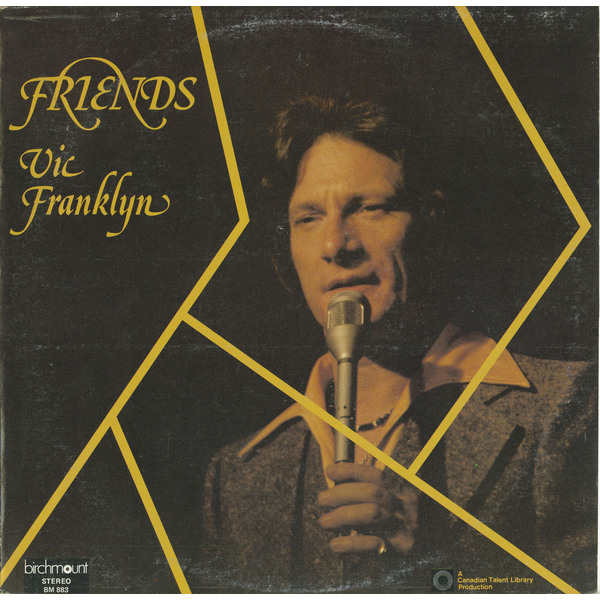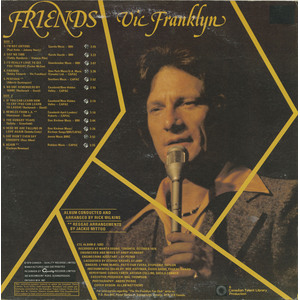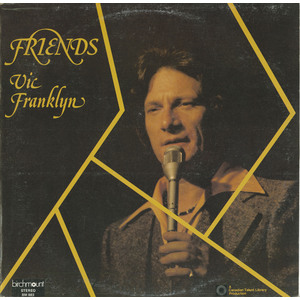Information/Write-up
Vic Franklyn was born Lyn Evans in Aberdare, a coal-valley town in South Wales whose musical lineage also produced Tom Jones. He grew up surrounded by singers he admired deeply, especially Vic Damone and Frank Sinatra; years later, when he began performing in Canada, he fashioned his stage name by combining theirs, a small gesture that reflected the style he naturally gravitated toward. Little is known about his early years in Britain, but by the late 1960s he had settled permanently in Toronto and began building a career in the lounge and supper-club circuit that flourished around the city. Regular engagements at the Hotel Triumph at Keele and Highway 401, clubs on Hamilton Mountain, and a restaurant at the Toronto airport made him a familiar draw, and fans remember him as an unhurried, gracious performer whose warm baritone filled a room without theatricality.
His timing coincided with the rise of the Canadian Talent Library, the broadcaster-supported program designed to supply high-quality Canadian recordings to radio in the new era of CanCon regulations. Franklyn was an ideal fit. Beginning in the early 1970s he made a run of albums that defined his recording legacy, all cut with Toronto’s top arrangers, session players and studios. Shangri-La, recorded at RCA Studios with George Semkiw producing and Rick Wilkins arranging, set the template: classic pop standards and contemporary soft-pop material framed in plush orchestral settings, with several tracks riding lightly syncopated rhythm patterns arranged by Jackie Mittoo and choral backing from Laurie Bower’s singers. It was an unusual combination at the time, giving Franklyn’s crooner phrasing a subtle reggae undercurrent that distinguished him from his American counterparts.
He developed the sound further on After All Is Said and Done, recorded with Wilkins, Mittoo, Andy Hermant, Bobby Edwards, Norm Amadio, Alex Lazaroff, Lynne McNeil and the Laurie Bower Singers. The record moves easily between string-rich ballads and rhythm-lightened interpretations of “Moonlight Serenade,” “You and Me Against the World,” and “More,” a balance that became his signature. Leave Tenderly, issued the following year and also shaped by Wilkins and Mittoo, carried the same mixture of nightclub intimacy and studio polish, with Franklyn’s versions of “Save the Last Dance for Me,” “Brazil,” “Every Time You Touch Me I Get High,” and “What I Did for Love” becoming favourites among his live audiences. His final studio LP of the decade, Friends, recorded at Manta Sound with Wilkins, Mittoo, Sy Potma and Andy Hermant, featured appearances by Eugene Amaro, Guido Basso, Moe Koffman and background vocalists Lynne McNeil, Patti Van Evera and Stephanie Taylor. Songs such as “99 Miles from L.A.,” “The Hungry Years,” “Perfidia,” and “Again” became staples of late-night Canadian radio long after the records left print.
Franklyn’s visibility grew through television as well. In 1976 CHCH-TV produced The Vic Franklyn Show, a half-hour performance series that aired on Saturday nights and was cleared in all major Canadian markets. Viewers remember him as a relaxed, confident host who approached television the same way he approached a supper-club stage: conversational, unforced, and guided by a singer’s instinct for phrasing rather than spectacle. His reputation within the Toronto scene was built on consistency rather than celebrity. He was known among musicians as a conscientious working vocalist who respected his band and relied on subtlety rather than imitation, even as audiences compared him to Sinatra and the Rat Pack.
He continued to record into the early 1980s, including a commercial single for the Samantha label produced by Andy DiMartino. For a period he lived in the Cobourg area before returning to Britain, spending his last years in London with his daughter Christine. Family recollections confirm that he remained proud of his Canadian career and the life he had built there, even as his records quietly slipped out of circulation. No official CD reissues were ever produced, but his recordings persisted through radio libraries and collectors, and decades later AM740 in Toronto reported receiving more listener mail about Vic Franklyn than almost any other artist on its playlist. Songs such as “Perfidia,” “99 Miles from L.A.,” “Again,” “Save the Last Dance for Me,” and several Carpenters covers remained staples of late-night programming, keeping his voice unexpectedly present for new listeners who had never heard of him but recognized something immediate in the way he sang.
What survives is a compact but distinctive body of work that captures a particular moment in Canadian studio culture. A Welsh-born vocalist in a Toronto room, backed by Rick Wilkins’s charts, Jackie Mittoo’s rhythmic sensibility, and the city’s finest session players, recording albums intended for broadcasters yet built with far more care than their modest budgets would suggest. For those who still search out the original CTL and Birchmount pressings, Vic Franklyn remains less a forgotten lounge singer than a reminder of an era when Canadian music could still embrace late-night elegance, soft rhythm, and a singer who understood the value of understatement.
-Robert Williston
Vic Franklyn: vocals
Eugene Amaro: saxophone
Guido Basso: trumpet
Moe Koffman: saxophone
Lynne McNeil: backing vocals
Patti Van Evera: backing vocals
Stephanie Taylor: backing vocals
Produced and Arranged by Rick Wilkins
Reggae Arrangements By Jackie Mittoo
Engineered by Sy Potma
Engineered and mixed by Andy Hermant
Recorded at Manta Sound, Toronto, October 1976



No Comments